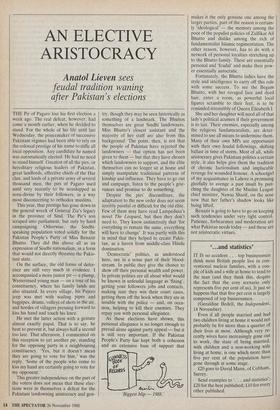AN ELECTIVE ARISTOCRACY
Anatol Lieven sees
feudal tradition waning after Pakistan's elections
THE Pir of Pagaro lost his first election a week ago. The real defeat, however, had come a month earlier, when he decided to stand. For the whole of his life until last Wednesday, the princemaker of successive Pakistani regimes had been able to rely on the colossal prestige of his name to stifle all local opposition. Any candidate he named was automatically elected. He had no need to stand himself. Greatest of all the pirs, or hereditary religious leaders of Pakistan, great landlords, effective chiefs of the Hur clan, and lords of a private army of several thousand men, the pirs of Pagaro used until very recently to be worshipped as semi-divine by their followers, in a way most disconcerting to orthodox muslims.
This year, that prestige has gone down in the general wreck of General Zia's legacy in the province of Sind. The Pies son scraped into parliament, but only by hard campaigning. Otherwise, the .Sindhi- speaking population voted solidly for the Pakistan People's Party of Miss Benazir Bhutto. They did this above all as an expression of Sindhi nationalism, in a form that would not directly threaten the Pakis- tani state.
On the surface, the old forms of defer- ence are still very much in evidence. I accompanied a more junior pir — a plump, Westernised young man — on a tour of his constituency, where his family lands are also situated. In every village, his Pajero jeep was met with wailing pipes and bagpipes, drums, volleys of shots in the air, and hordes of villagers pressing forward to kiss his hand and touch his knee.
He met the latter action with a gesture almost exactly papal. That is to say, he bent to prevent it, but always half a second too late. That afternoon, I commented on this reception to yet another pir, standing for the opposing party in a neighbouring constituency. 'Yes, but it doesn't mean they are going to vote for him,' was the reply. 'Some of the people who come to kiss my hand are certainly going to vote for my opponent.'
This greater independence on the part of the voters does not mean that these elec- tions were in themselves a defeat for the Pakistani landowning aristocracy and gen- try, though they may be seen historically as something of a landmark. The Bhuttos themselves are great Sindhi landowners. Miss Bhutto's closest assistant and the majority of her staff are also from this background. The point, then, is not that the people of Pakistan have rejected the landowners — that option has not been given to them — but that they have chosen which landowners to support, and the elite themselves can no longer sit at home and simply manipulate traditional patterns of kinship and influence. They have to go out and campaign, listen to the people's grie- vances and promise to do something.
Despite the pirs' discomfiture, the adaptation to the new order does not seem terribly painful or difficult for the old elite. Few of them may have read Lampedusa's novel The Leopard, but then they don't need to. They know instinctively that 'for everything to remain the same, everything will have to change'. It was partly with this in mind that they helped to create Pakis- tan, as a haven from middle-class Hindu domination.
`Democratic' politics, as understood here, are in a sense part of their blood- stream. In public they give the chance to show off their personal wealth and power. In private politics are all about what would be known in unfeudal language as 'fixing', getting your followers jobs and contacts, making sure they win their court cases, getting them off the hook when they are in trouble with the police — and, on occa- sion, helping to kill their enemies. They repay you with personal allegiance.
As these elections have shown, this personal allegiance is no longer enough to prevail alone against party appeal — but it is still very important. If the Pakistan People's Party has kept both a cohesion and an extensive base of support that `Biggest blip — 1988.' makes it the only genuine one among the larger parties, part of the reason is certain- ly 'ideological' — the memory among the poor of the populist policies of Zulfikar Ali Bhutto and dislike among the rich of fundamentalist Islamic regimentation. The other reason, however, has to do with a network of personal loyalties stretching up to the Bhutto family. These are essentially personal and 'feudal' and make their pow- er essentially autocratic.
Fortunately, the Bhutto ladies have the style and intelligence to carry off this role with some success. To see the Begum Bhutto, with her ravaged face and dyed hair, enter a room, as powerful local figures scramble to their feet, is to be reminded irresistibly of Queen Elizabeth I.
She and her daughter will need all of that lady's political acumen if their government is to last. Their enemies, especially among the religious fundamentalists, are deter- mined to use all means to undermine them. Many of their own MPs are opportunist with their own feudal followings, shifting ballast in time of storm. Most of all, while aristocracy gives Pakistani politics a certain style, it also helps give them the tradition of chronic factionalism and implacable revenge for wounded honour. A schoolgirl of my acquaintance in Lahore is promising gleefully to avenge a past insult by pun- ching the daughter of the Muslim League chief minister, Nawaz Sharif, on the nose now that her father's shadow looks like being lifted.
Benazir is going to have to go on keeping such tendencies under very tight control. Patience, forbearance and moderation are what Pakistan needs today — and these are not aristocratic virtues.










































































 Previous page
Previous page